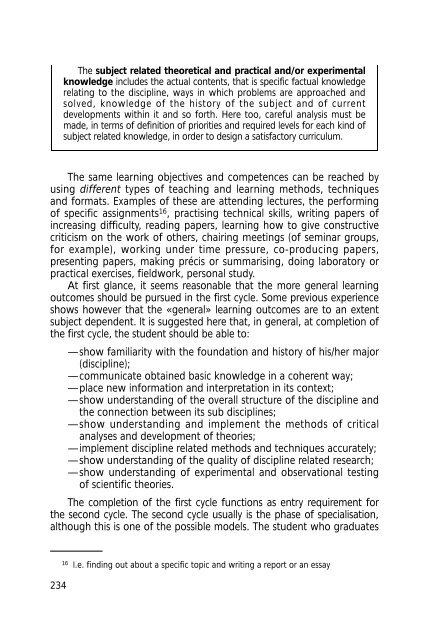Final Report Pilot Project - Relaciones Internacionales de la ...
Final Report Pilot Project - Relaciones Internacionales de la ...
Final Report Pilot Project - Relaciones Internacionales de la ...
Create successful ePaper yourself
Turn your PDF publications into a flip-book with our unique Google optimized e-Paper software.
The subject re<strong>la</strong>ted theoretical and practical and/or experimental<br />
knowledge inclu<strong>de</strong>s the actual contents, that is specific factual knowledge<br />
re<strong>la</strong>ting to the discipline, ways in which problems are approached and<br />
solved, knowledge of the history of the subject and of current<br />
<strong>de</strong>velopments within it and so forth. Here too, careful analysis must be<br />
ma<strong>de</strong>, in terms of <strong>de</strong>finition of priorities and required levels for each kind of<br />
subject re<strong>la</strong>ted knowledge, in or<strong>de</strong>r to <strong>de</strong>sign a satisfactory curriculum.<br />
The same learning objectives and competences can be reached by<br />
using different types of teaching and learning methods, techniques<br />
and formats. Examples of these are attending lectures, the performing<br />
of specific assignments16 , practising technical skills, writing papers of<br />
increasing difficulty, reading papers, learning how to give constructive<br />
criticism on the work of others, chairing meetings (of seminar groups,<br />
for example), working un<strong>de</strong>r time pressure, co-producing papers,<br />
presenting papers, making précis or summarising, doing <strong>la</strong>boratory or<br />
practical exercises, fieldwork, personal study.<br />
At first g<strong>la</strong>nce, it seems reasonable that the more general learning<br />
outcomes should be pursued in the first cycle. Some previous experience<br />
shows however that the «general» learning outcomes are to an extent<br />
subject <strong>de</strong>pen<strong>de</strong>nt. It is suggested here that, in general, at completion of<br />
the first cycle, the stu<strong>de</strong>nt should be able to:<br />
—show familiarity with the foundation and history of his/her major<br />
(discipline);<br />
—communicate obtained basic knowledge in a coherent way;<br />
—p<strong>la</strong>ce new information and interpretation in its context;<br />
—show un<strong>de</strong>rstanding of the overall structure of the discipline and<br />
the connection between its sub disciplines;<br />
—show un<strong>de</strong>rstanding and implement the methods of critical<br />
analyses and <strong>de</strong>velopment of theories;<br />
—implement discipline re<strong>la</strong>ted methods and techniques accurately;<br />
—show un<strong>de</strong>rstanding of the quality of discipline re<strong>la</strong>ted research;<br />
—show un<strong>de</strong>rstanding of experimental and observational testing<br />
of scientific theories.<br />
The completion of the first cycle functions as entry requirement for<br />
the second cycle. The second cycle usually is the phase of specialisation,<br />
although this is one of the possible mo<strong>de</strong>ls. The stu<strong>de</strong>nt who graduates<br />
234<br />
16 I.e. finding out about a specific topic and writing a report or an essay


